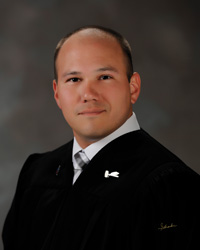Jayhawk Judges: Hon. Layatalati Hill, L’12
Layatalati Hill always knew he wanted to do work that helped people.
 A citizen of the Oneida Nation, Hill grew up on the Oneida Indian Reservation in northeastern Wisconsin. After his education brought him to Lawrence to attend Haskell Indian Nations University, he enrolled at KU Law, earning a J.D. and Tribal Lawyer Certificate in 2012.
A citizen of the Oneida Nation, Hill grew up on the Oneida Indian Reservation in northeastern Wisconsin. After his education brought him to Lawrence to attend Haskell Indian Nations University, he enrolled at KU Law, earning a J.D. and Tribal Lawyer Certificate in 2012.
Hill returned to Oneida after graduation, starting out as a staff attorney with the Legislative Reference Office for the Oneida Nation. When the Oneida Judiciary established a trial court system in 2014, Hill saw an opportunity to give back to his community in a new way. He ran for one of the newly created trial court judge positions, winning a six-year term that ended in 2020, when he was elected chief judge.
Now, as chief trial court judge for the Oneida Judiciary, Hill oversees a civil court that includes two trial court judges, a trial court clerk and a wellness court coordinator. Hill’s six-year term as chief judge runs through 2026.
“I just wanted to come back and help out the community however I can. If it’s serving as a judge or being an attorney or helping in any other way, really — it works out right now that I’m serving the community as a judge,” Hill said.
Building a new court system
The trial court of the Oneida Judiciary handles a wide range of civil cases, including evictions, foreclosures, and disputes about contracts, wage garnishments, small claims and workers’ compensation. Cases that deal with a person’s house or their income can get emotional, a responsibility Hill takes seriously.
“They are very big decisions,” Hill said. “We try to give our community members a place to come and aggrieve their disputes, so we can let them tell their side of the story and be heard and issue a fair decision.”
Before the trial court system was added to the Oneida tribal constitution in 2014, an appeals committee of the Oneida Tribal Judicial System took on civil matters. The new system offers a greater separation of powers, Hill said.
Coming on in 2014 as one of the first judges for the new constitutional court “was a big learning curve,” Hill said. There were internal processes and procedures to develop, working within the justice system’s new rules of civil procedure. Along with adjusting to a new court system, Hill also switched from making arguments to hearing them.
“You have to change your mindset from having an advocacy role versus having a neutral position,” Hill said.
As a chief judge elected in July 2020, Hill had a new set of adjustments to make to keep the courthouse open to the public during the coronavirus pandemic. Hill worked with the chief appellate court judge and two family court judges to coordinate the court’s response.
“We all met together and had to come up with the policy for COVID. And luckily, we were able to hammer that out quickly, so we were able to stay in operation,” Hill said.
Feeling heard
Oneida trial court judges write their own decisions. It’s one of the parts of the role that Hill finds the most rewarding and important.
Many of the parties who come to the court are not represented. Hill makes a point to write decisions “explaining things in a way that anybody can understand.” Most cases have a winner and a loser, and there’s usually one side that’s not happy.
“I always try to make sure when parties come before me, I give them an opportunity to say what they want to say, so they feel heard,” Hill said. “In my decisions, I make sure I explain it in a way that they understand. So, they may not have won their case, but hey, they felt heard, and they get it, they understand why I made the decision that I did.”
Walking the line of being involved in the community and maintaining a professional boundary can be a challenge, and the divide can be isolating, Hill said. He works to combat any negative perception of the court by helping parties understand the law and the court’s decisions.
Providing education
Hill credits the legal writing courses at KU Law for helping to build a base that he uses for decision writing. An externship he did during law school with the Legislative Operating Committee of the Oneida Nation exposed Hill to researching and drafting tribal law. Hill encourages law students to take any opportunity to get real-world experience while they’re in school.
Since the start of his first term as a trial court judge, Hill has served on the board of directors for the National American Indian Court Judges Association (NAICJA). He recently started a three-year term as secretary-treasurer for the board.
“I’ve always been pro-education, and I think that’s one of the biggest parts of NAICJA, is providing education for tribal judges and tribal courts,” Hill said. The organization also “helps to educate other non-Natives who might not know anything about tribal courts or have never met a tribal judge or been to a tribal court,” he said. As a board member, Hill works to provide that education and training.
“Being a part of that, being able to help other tribal communities in any way, is definitely something I like to do,” Hill said.
This article appeared in print in the 2021 KU Law Magazine.